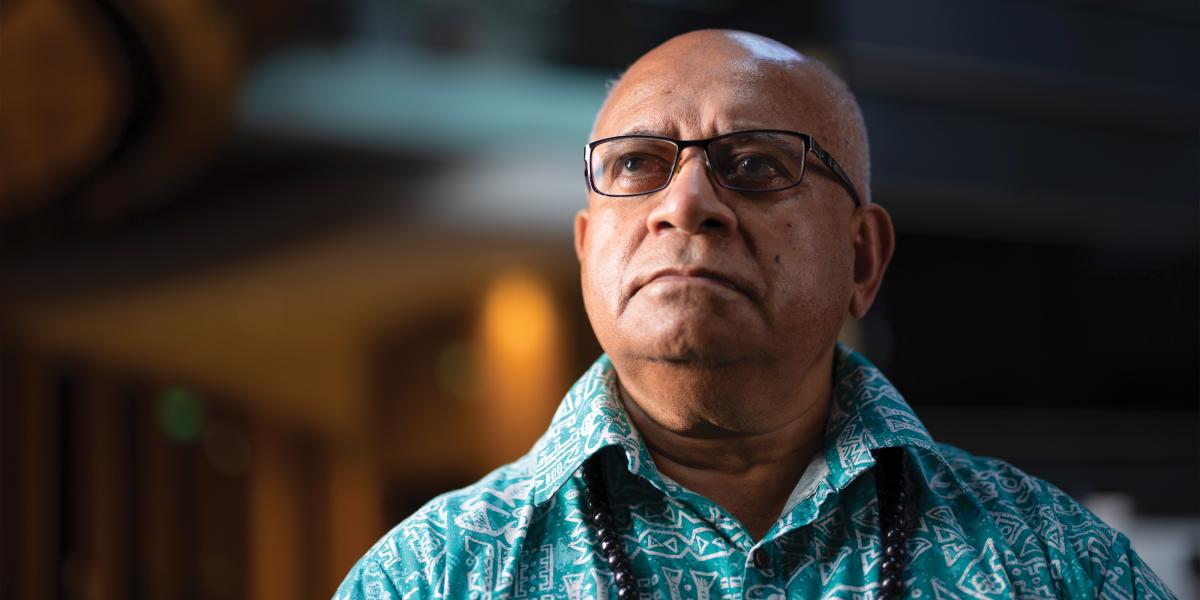Indigenous Knowledge Offers Solutions to Environmental Crises
Ancient wisdom supported my people for thousands of years—and can heal the polycrisis threatening the modern world.
While planetary health may be new and novel to many, it is as ancient as the land to Indigenous people like me.
Growing up on our small island of Ha’ano, in Tonga, in the middle of the Pacific Ocean, we learned early on from our grandparents and other elders that we humans are inextricably one with the Fonua—Mother Nature.
So central is the concept of Fonua to our physical and spiritual reality that the womb, this physical plane of existence, the grave, and the hereafter are all called Fonua. Fonua is the inseparable connectedness of the web of life. It is the basis of our knowledge system and its values within.
“You are the Fonua, the Fonua is you. Look after the Fonua, and the Fonua will look after you,” Grand Uncle Masoe, a master navigator and farmer who adopted me, used to say.
Whether spending time at home, working in the garden, or fishing at sea, Grand Uncle Masoe and other elders—both male and female—would teach us the sustainable, ecological circle of life, and how we should take enough for our needs but not for our greed.
Masoe, as people called him, taught us how planting yams, kumara, and other crops within certain phases of the moon provides the highest yields. Based on the same lunar calendar, he showed us how choosing the right season and weather can help us catch a few big fish for our needs and leave the young ones to flourish.
He learned the wisdom of the Fonua from the village elders, not from any European-based school. But it is a dying knowledge because of Eurocentric knowledge that came into our world with colonization. That is why I am working hard to preserve and advance Indigenous wisdom.
The 476 million Indigenous people of the world are already making a significant contribution to the well-being of the planet and humanity.
Our ancestors’ knowledge and vision were beyond the lessons of this planet. We looked to the stars, the sun, the sea, and the wind as our guide for thousands of years when we navigated the Moana, the biggest ocean in the world (known later as the Pacific Ocean). The pathway of the moon and other celestial elements informed all human activities from fishing and farming to cultural festivals and recreational activities.
We Indigenous peoples in small Pacific nations have been living in harmony with Mother Nature and not against her. Her biodiversity flourished until Pacific Rim nations and the major powers brought unsustainable whaling and deep-sea trawling. They also dumped their rubbish and left their nuclear waste in our collective home. Environmental crises and global warming are a matter of life and death for us.
My Indigenous education and the impact of global environmental crises prompted me and my team at the Health Promotion Forum of New Zealand / Runanga Whakapiki Ake I Te Hauora o Aotearoa to co-organize the 23rd World Conference on Health Promotion with the International Union for Health Promotion and Education (IUHPE) in Aotearoa (New Zealand) in 2019.
Our twin Legacy Statements from the conference have shaped the strategic direction of IUHPE and informed our contributions to the WHO’s Geneva Charter for Well-being in 2021. The statements refer to Indigenous knowledge systems as solutions to the unprecedented decline in the well-being of the planet and humanity. For example, our socio-ecological and spiritual knowledge and values of being one with Mother Nature can inform public policies to become more environmentally conscious. Our systemic way of knowing that all beings are interdependently connected can shape social and economic systems to become more sustainable. It can also help our fellow humans to be more compassionate to each other and Mother Nature, and live a happier life in a healthy world.
The 476 million Indigenous people of the world are already making a significant contribution to the well-being of the planet and humanity. The planet’s biodiversity is decreasing rapidly, but 80% of the remaining land biodiversity is in lands for which Indigenous peoples are custodians.
While we must urgently address the environmental crisis, we also must recognize it is part of a bigger, human-induced polycrisis that includes geopolitical conflicts, obsolete economic systems, and health challenges such as COVID-19.
We humans have lost the plot. We value material prosperity at the expense of spiritual well-being. We have lost our balance. Our crisis is ethical and spiritual and can only be addressed effectively if we include those missing dimensions of holistic well-being.
